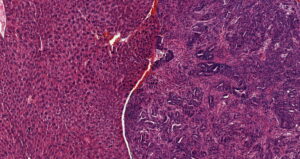
Importance of PI3K isoforms in pathophysiology
Dr B.Thibault a Dr M.Dufresne
Cancer is a disease induced by DNA modifications called genetic alterations. One of the major effects of these alterations is to activate cell signalling. Abnormal activation, known as pathological activation, leads to cancer and is called oncogenic signalling. This process is a complex, multi-stage biological phenomenon, from disease initiation to progression to metastatic states. In all these stages, communication networks are tightly regulated; class I, II, III PI3Ks are key elements in their control.
Thus, the SigDYN team of the CRCT is interested in the most frequent oncogenic signalling found in cancers, the so-called PI3Ks signalling. Indeed, among the first 4 most mutated genes in cancer, there are 3 genes whose genetic alterations affect PI3Ks.
In the various stages of carcinogenesis, these PI3Ks are mutated or overactivated in cancer cells but also in surrounding cells such as immune cells, fibroblasts and non-transformed cells forming the tumour microenvironment.
PI3Ks come in 8 forms called “isoforms”. They respond to chemical signals (sugar levels, nutrients, contaminants, inflammation, chemotherapy in the tumour) or mechanical signals (tumour stiffness, tumour cell aggregation) by increasing their ability to produce signaling lipids to promote carcinogenesis processes.
We have been studying the role of class I PI3Ks in this multi-step process for the past 10 years; however, the role of class II and III PI3Ks, which regulate vesicular trafficking in cancer, is generally still unknown.
The objective of axis 1 of the SigDYN team, also involving Dr. B. Thibault and Dr. M. Dufresne, is to study the roles of PI3Ks as well as the cellular processes controlled by these enzymes (metabolism, vesicular trafficking, autophagy, protein degradation, inter-cellular dialogue) in this multi-step process. The team develop a unique and novel multidisciplinary expertise including transgenic models, orthotopic transplants, bioprinting, primary cultures, pharmacology, transcriptomic analysis at the cellular level coupled with bioinformatics, with the common objective of understanding and targeting these autonomous and non-autonomous mechanisms of cancer oncogenic pathways.
Thus, the projects currently being developed are the following:
- Link between the PI3K/AKT pathway and metabolic flexibility during pancreatic cancer treatment (led by C. Cayron).
- Characterize the role of the class III PI3K, VPS34, as a key regulator of exocrine pancreas homeostasis. VPS34 is at the crossroads of autophagy induction, autophagosome degradation and endosome recycling signals (led by Dr. B. Thibault and C. Guyon).
- Establishing the role of proteins activating protein degradation in the initiation of pancreatic cancer and associated pathologies such as pancreatitis (led by Dr. M. Dufresne).
In this line of research, we focus on pancreatic cancer, a cancer with a poor prognosis in which class I, II and III PI3Ks are deregulated.


